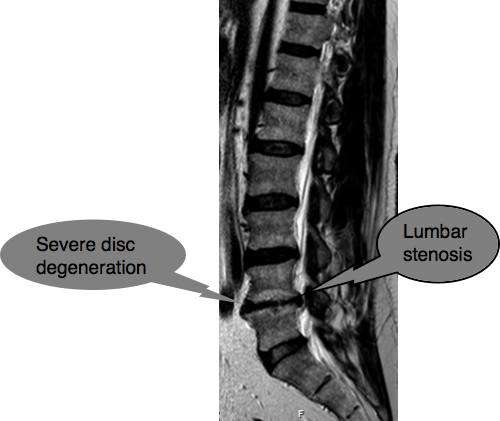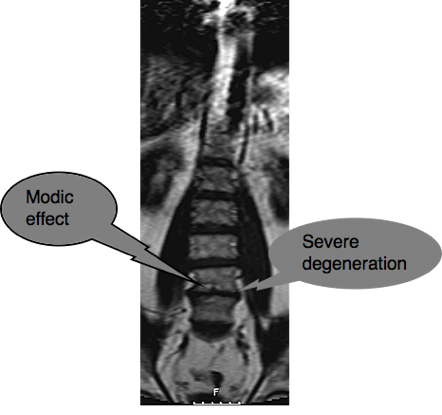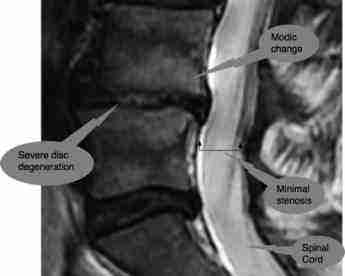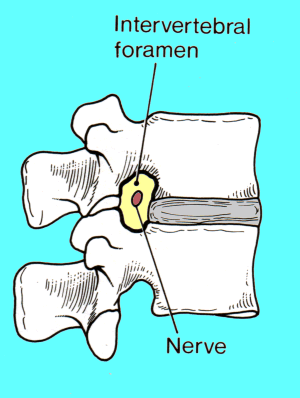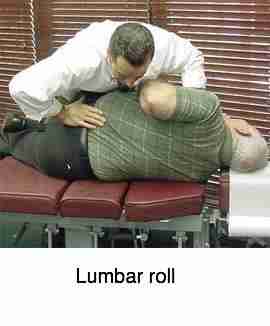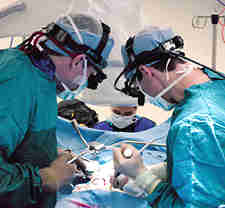| Back to Back Issues Page |
 |
|
Chiropractic Help, Issue #08 - Lumbar-Stenosis June 15, 2009 |
DearLumbar StenosisThis email, alas, has nothing to do with last month's Friday Fun, nor the flippant business of the month before, nor about smelling the roses. Lumbar stenosis is a serious business and not at all uncommon. It means pain, and often lots of it. Pain in the low back, and pain in the leg. That is not fun! However, let's keep in mind that once your episode of Lumbar Stenosis is over (with Chiropractic of course) it's hiking and swimming every week that are going to ensure that you not only get well, but more important, STAY WELL. "Most success springs from an obstacle or failure. I became a cartoonist largely because I failed in my goal of becoming a successful executive." - Scott Adams, creator of Dilbert, which is syndicated in more than 2,000 newspapers in over 80 countries, making him one of history's most successful cartoonists. (PS. I failed miserably as a high school teacher. Keeping 30 odd kids entertained, learning, and disciplined was definitely not my forte. That became the 'failure' that paved the way for me to have the confidence to tackle a medical and chiropractic nightmare: LUMBAR STENOSIS.)
First, from the CHIROPRACTIC COALFACE
Fig 1.
Mr S is 51 years old. (Fig 1&2 are his scans). He has a job in the auto industry, and has had low back pain for years, managed in the usual medical fashion. Pain killers, anti-inflammatories (NSAIDs), and Physiotherapy. It kept the pain at bay until 9 months ago when he developed very severe pain in the groin, and all the way down the leg. Pills, physiotherapy, brought little relief. Rather, it was getting worse. As I'm sure you know, the auto industry is in great distress. They're making too many giant, fancy, gas-guzzling cars, ignoring the obvious trends when even nincompoops like you and me could read the writing on the wall. Any employee who can't come to work, for what ever reason, justified or not, is likely to find himself out of a job. Happily, Mr S is back at work, full-time, working an almost normal job. All around him, colleagues are being retrenched. Can you see the severe degenerative changes at L4-L5 in Fig 1, and the even more severe narrowing of the spinal canal? That's SPINAL STENOSIS.
"Experts have their expert fun ex cathedra telling one just how nothing can be done." Piet Hein
Modic Changes (MC)
A Danish medical study states: "The clinical experience is that many patients with modic changes (MC) have relatively severe and persistent LBP, which typically appears to be resistant to (medical) treatment. Furthermore, a retrospective study at The Backcenter Funen shows that patients with MC fail to improve if they need to engage in physical activity." The whole truth? Furthermore, Mr S. was fully informed about the severe degenerative changes in his back. It was spelt out. "You have arthritis." And he does. Interesting RESEARCH concludes: "Patient knowledge of (the serious) imaging findings do not alter the outcome and are associated with a lesser sense of well-being, and poorer general health when compared to the group who were not told how severe their condition was." Am J Neuroradiology. 2008 Jun;29(6) This creates an awful dilemma for the practitioner in the field. Do you spell it out to the patient, tell him to whole truth and nothing but the truth, knowing full well that it means that his well-being and your chances of winning with his/ her condition will have immediately taken a serious turn for the worse? Or do you tell him a half truth: 'Mm, nasty back, but don't worry, we'll fix you up!" Hope, without hope, your doctor's chances of winning are dramatically reduced. Doctors surely must never pull the rug out from under their patients' feet. Or, should they tell them the whole truth?
ResearchA Finnish study found only three significant factors with Modic changes: "CONCLUSION:MODIC CHANGES. What are they? Deep within the bone itself (the vertebral body) bone marrow lesions are found (fluid and swelling) visible only on MRI (not on X-ray), and they are assumed to be associated with painful intervertebral disc disease - that's the white stuff you can see in the bone in Fig 1 and 2 of Mr S's scan, and in Fig 3 below (another patient without spinal stenosis) Like a sprained ankle, fluid accumulates in the tissue and, in the case of modic changes, deep within the bone itself. Pain!
SPINAL STENOSISStenosis comes in two forms:
Nerves travelling down the spine in what we call the Cauda Equina (horse's tail) may be entrapped either in the spinal canal (as in Mr S's case), or within the foramen, causing compression of the nerve(s), or both. Both Central and Foraminal stenosis are a clinical nightmare, for the chiropractor, orthopaedist and neurologist. Nerves are the most sensitive tissues in the body. It hurts and the leg may become numb and weak.
Because of the horror of spinal surgery (including the dangers of anaesthetics) even Medicine begins with conservative care: Anti-inflammatories and cortisone to reduce inflammation (both orally and injections into the spinal canal) and even "Physical Therapy". Hence Chiropractic.
Correctly, mostly gently but sometimes with considerable force, the Lumbar Roll has saved many, many persons from invasive Lumbar surgery.
Alternatively, you can read at this link how Chiropractors will tackle the low back and pelvis.
Anti-inflammatoriesA short course of NSAIDs has an important place in the management of Lumbar Stenosis. Whether you start with Chiropractic or with pills, will depend on your philosophy. Medicine is looking to suppress the inflammation in the hope of slowing the structural disease progression, whereas in Chiropractic we aim to get the joint moving again, rehab the muscles and other tissues, and getting you eating foods rich with anti-inflammatory properties (like Celery).But taking either pills, or continuing for long periods with Chiropractic, when neither obviously are working, makes no sense at all. The cost to Mr S was about 15 Chiropractic and Rehab treatments. Less than $ 1000, none of which was paid by his insurance. "Chiropractors are considered 'kwaksalvers' or quacks in the Netherlands by much of the medical establishment." He now comes in once a month to maintain the condition. I'm cautiously optimistic!
Economic burden of Low Back Pain. TipLeg length is an important consideration. It's been researched, and conclusively proved to cause arthritis in the hip and knee, and in my opinion also in the lumbar spine, because of the resultant spinal curvature.
Nutritional corner: CeleryThe piquant flavour of chopped Celery adds class to any salad, and children love to chew on a whole stalk. Its fibre, of course, promotes a happy colon and celery is particularly rich in natural Vitamin C - one stalk will provide a tenth (10%) of your daily need.Many studies have confirmed the need for natural Vitamin C (there are question marks concerning Ascorbic Acid, the synthetic form of Vitamin C) to prevent colds and flu. Vitamin C also prevents free radical damage to tissue, reducing cancer, arthritis and preventing cholesterol from being oxidised to its deadly cousin, Oxy-cholesterol. Tip: Never deep-fry repeatedly with the same oil: oxy-cholesterol.
Do you bruise easily? Vitamin K is the vitamin that promotes clotting, and only one stalk of celery provides a quarter of daily needs. Celery is also rich in many other minerals and vitamins (like Folic acid and calcium and potassium, hence its salty taste) and is very low in calories (10 cals in a stick). Blood pressure Celery has long been used by Ayurvedic medicine for the treatment of blood pressure though I could find no convincing studies. For more information from an excellent site, click here. Toscanini's Celery SoupThe maestro demanded Celery Soup before every performance. Celery is known to calm the nerves, another reason perhaps why it lowers blood pressure. So easy to make.Baba GanoushBaba Ganoush is one of my very favourite dishes to go with your celery salad, made from Eggplant, yoghurt and garlic and Tahini (ground sesame seeds) and olive oil. Add some variety to your cooking! Eggplant (aubergine) is also known for its cholesterol lowering properties.
Until next month then. Promise not to fill your Inbox with information overload.
Should you have found this email helpful, feel free to forward to family and friends. Your doctor?! Our readership is rising in leaps and bounds, up 130% on last month, but for the considerable work put in, I would prefer it to go to 5 000 people! Yours in Better Health. Take a walk today, it keeps the chiropractor away (unless you have a short leg) and eat an apple every day. That does indeed keep the doctor away.
|
| Back to Back Issues Page |
